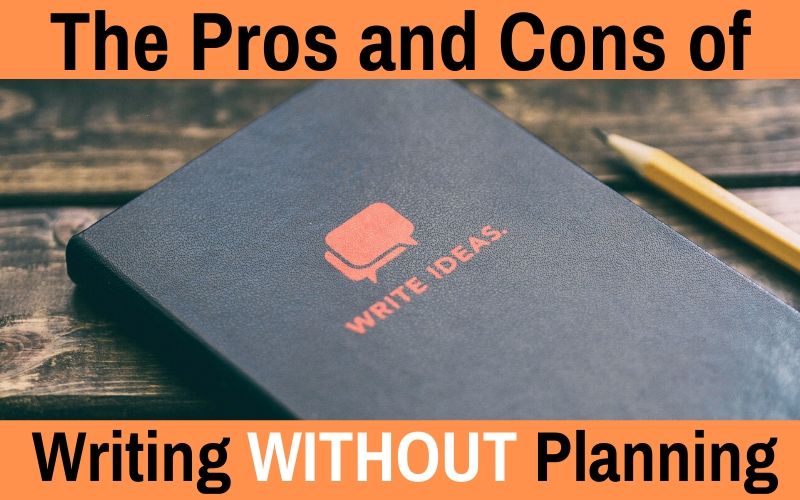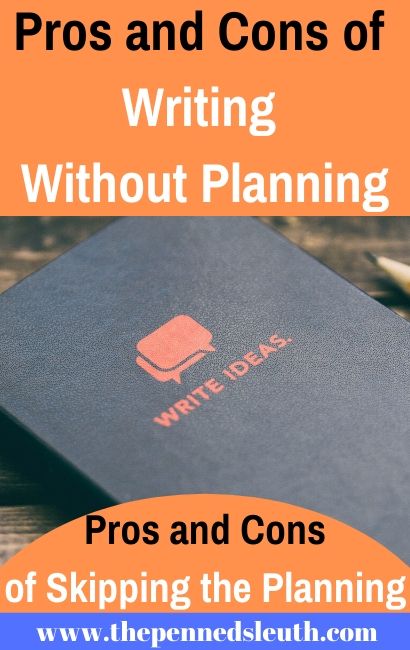Latest Writing Video! |
|
The idea of doing anything creative without planning is common enough. In our youth, whether it was art or writing, we just started. We were either eager to write or eager to get it over with. For some writers, writing without planning is their way of doing things. Perhaps you are considering writing this way with your next novel, so here are some pros and cons about writing this way. Let’s begin! The ProsI always prefer to start these lists with some solid information on the benefits before the cons. You wan't to know what works, before you know what doesn't. Otherwise, you don't know what you could be missing out on. Without further ado, let's start with the first pro! You are Not RestrictedThere are some fantastic benefits to planning and it’s the same with not planning. First, the major pro of this free-writing style is that you are not restricted as a writer. In a way this can be a brilliant pro as far too many writers take planning too far and restrict themselves. The plot is less likely to hit a dead-end as writing this way frees the mind. A writer rides on their imagination and there are few obstacles that can stop that. I often stress to those who are planning that they need to keep their scenes and chapters vague enough to give them this freedom. A restricted writers struggles far more than a writer who an abundance of planning and little direction. With that in mind, if this is a major problem you are encountering, try starting a novel without planning and see where it takes you. You may be surprised. Characters are Spontaneous and InterestingSecond pro, writing without planning allows for more spontaneous and interesting characters to be developed. Planning is often likened to a serious process, which means the first thing a writer is concerned with when planning is creating a logical structure. Of course, this is another restriction, not just plot-wise, but character-wise. It is fairly difficult to break out of this mold, especially since more chaotic, amusing characters are hard enough to write already. In these cases it would be better to write without any semblance of planning, in order to make this fun and interesting character. As you can imagine, it all comes down to the type of book you want to write. It Saves You TimeThird pro, it saves you time in the long-run. One of the many pieces of advice I share with my students is that you need to finish, no matter how awkward or unrealistic some scenes might turn out. There are too many writers already who are abandoning their books when they hit the tough-to-write spots in their novel. It is more than a shame. Which is why skipping the planning process might help them establish this flow in their writing as well as save them time. I often advise that a writer takes a week, minimum, to plan out their novel. For more complex or lengthy reads, a month. As you can imagine, saving yourself that extra week to a month ensures you have more time writing. It Lends an Entertain Charm to WritingFourth pro, writing without planning helps restore the spontaneous fun of writing. Often in this career you have a novel thought up and planned months before you start writing. You note the idea down, a possible title and a plot synopsis. Later, when you feel like writing it, you start the planning. The space between the idea and planning can be several months to years. In these months the book has run through the writer’s mind several times until they can’t bear it anymore and simply begin. Yet, it is an amazingly slow process. If you are in the mood to write and an idea crosses your mind, pretend it’s the first time you ever wrote and start straight away. In that moment you will find how fun writing can be, as you are not only experienced enough to write something at least half-decent, but you will find the experience an enjoyable one too. Writing Without Planning is a Writing MethodFifth and final major pro, writing without planning is a legitimate method of writing, so it doesn’t make it any less viable than writing with planning. Many writers out there make their living this way, selling books that began so quickly and ran with the writer’s imagination. What is more is you might find this method to be your true way of writing. It always pays to experiment with different writing methods and this one is no exception. You as a writer have a certain personality and life-style, so some methods are no doubt more comfortable than others. In which case, you writing will flourish and you will improve as a writer. Those are the top pros when it comes to writing without planning. I felt that the pros were worth talking about first, as it is best to see the good before the bad. So often people are turned off by the negative they fail to see the positive they are in favour of. Now, I will be discussing what this methods shortfalls are. The ConsThe are of course cons when it comes to writing without planning. Yet, before I get into them, writing style is all about preference. Perhaps these cons may not be so big to, where they are big to others. If you are the former of those two, I recommend you give writing this way a try. With that, let’s discuss the first con of writing without planning. The Plot Lacks StructureFirst, without proper planning a plot is difficult to structure logically. In order to create a more realistic and logical plot a timeline needs to be developed. With that timeline you as a writer need to decide how long certain events and scenes will last and how much time passes in between. Yet, if you write without planning structuring this timeline become far more difficult, forcing you to be vague with how time works. Doing so can ruin any sort of immersion that you’re going for if time is an important feature of your book, which is likely, whether you have considered it or not. With that being said, this is a major con that can result in a story that falls flat and appears amateurish. You Hit More Dead-EndsThe second con is the frequency of dead-ends. While it may be easy for your imagination to help you overcome these obstacles, you soon find that you are encountering dead-ends more often than if you had plotted out the sequence of events. It could be small mistakes at first, but it is more than likely that the further you go into your novel you will consider organising details to help you, in essence, emergency planning. Now, I must stress that in addition to overcoming these obstacles with imagination at your side, these dead-ends are a major warning sign that your plot is taking a wrong turn. Encountering a dead-end is common enough and it is easy for a reader to spot them. The solution would be rewriting certain scenes or sacrificing logic in your plot. Characters are Often 2-DimensionalThird con, a lack of planning can result in fairly two-dimensional characters. You can decide what they look or act like on the fly, but when it comes to adding depth, you need to put thought into their past and future. What are their goals in the novel and why do they desire to reach them? How did they grow up and why are they so important in the grand scheme of things that they became a character in your book? Many important questions that if left unanswered or even vaguely hinted at can make the character uninteresting. A reader's interest in a character is important, as if they don’t care about them, then that character is a pain to read about. Antagonist or protagonist, a character needs depth to have meaning in the reader's eyes, not just the plots. You are Less Likely to Finish the BookFour and finally, you are less likely to finish your novel without planning. Having direction in your novel is important, as you know where your story is going. In most cases an author who does not know when their story is going will not finish writing their story. Having an idea not only helps most writers finish their novels, but it also helps them understand how important a certain scene is to a novel’s plot. If you struggle with dedication, then planning is exactly what you need. Writing without will not guarantee that you finish your novel, but it certainly is a way to keep your interest high. You have put more effort into the writing process, more time. With all this, you have essentially convinced yourself this is something important, as well as fun. ConclusionThere you have the major pros and cons of writing without planning. I hope you found this information useful in deciding whether to start your next novel straight away or to put time into planning first. I hope you enjoyed and as always… Good day, goodnight and happy writing! Thank YouDear Writer, As a big thank you for reading this article I would like to offer you something for FREE! A writing course on how to improve your main character! Click here to check it out your course. In addition, if would like to receive more content, bonuses and some big discounts on future courses, join the writers group here. Thank you very much for reading! Kind regards Matthew Dewey, Writer Pin for Later!
0 Comments
Leave a Reply. |







